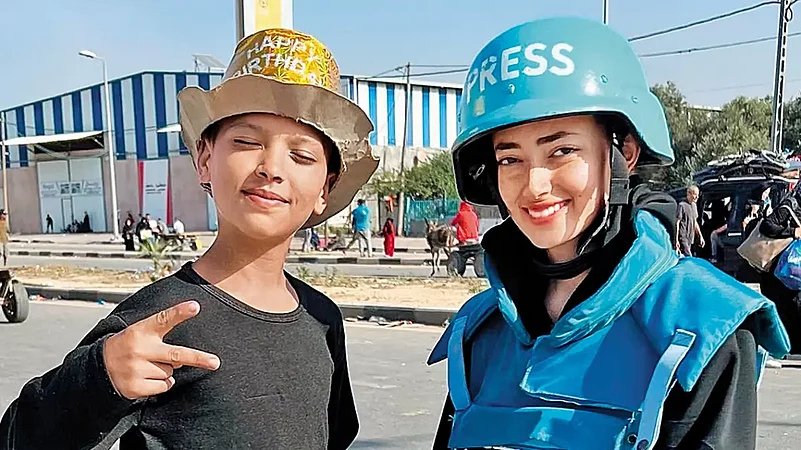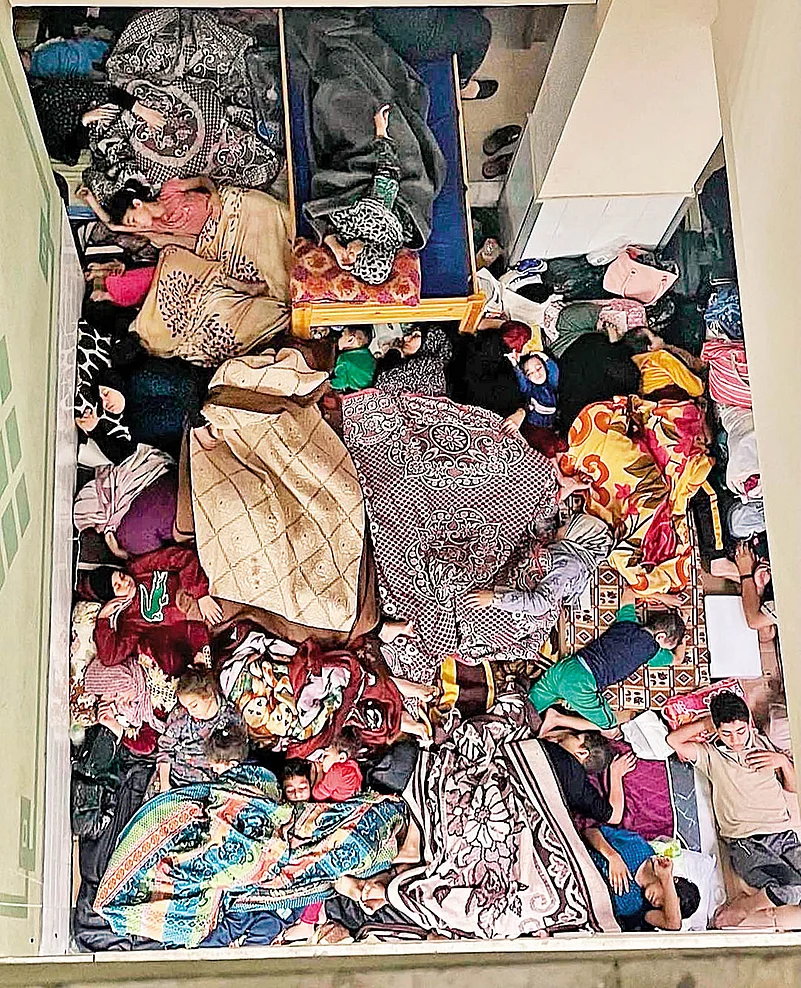She turned 22 on December 10. Dense smoke, dust, debris, rubble, broken windows, discarded memories, lost homes, unidentified photo albums —these were her birthday gifts. She posted videos, photos, and journal entries chronicling the war and its impact on her homeland since October 7. Her Instagram handle @byplestia that used to be a space for posting her social life updates —her spending time at libraries, restaurants, or the beach at Gaza with her friends— is no longer a virtual space for giving ‘life updates’. It now works as evidence that she is still alive.
How Plestia Alaqad Took To Social Media To Document Israel’s War On Gaza
Palestinian journalist Plestia Alaqad has been sharing the everyday struggle for survival in the ravaged city of Gaza.

This is Plestia’s journey — from the day her house was bombed to the present moment when she awaits a ceasefire.
October 9: Plestia walks through her neighbours’ houses and rushes to check on her parents. Deafening sounds of bombs, shaky window panes and smoke are the witnesses. The sounds of sirens intensify. A pause. Another bomb. Fortunately, she is still alive. ?
October 10: In the impenetrable darkness, Plestia runs?for her life. They have bombed some apartments in her building. But there is an update: “I still don’t know how I made it out alive. TURNS OUT NOT THE WHOLE HOUSE IS BURNED.” ?
October 11: No electricity, no internet. No water. Ambulance can’t even reach any place. She went to her house. Though it is still there, it is ravaged. Within the rubble of a nearby house, she finds family photographs, albums of unidentified people. Who are these people lost in the dust?

October 12: “You have 3 minutes to evacuate” is what they hear every morning besides the sounds of sirens and bombs. Sometimes, one doesn’t even get the warning. You have to run, but where to? Nobody knows. Plestia writes, “Basically I’m talking about how I’m feeling with all the evacuation that’s going on. I met a young girl. Her name is Dana and she shared her experience with me — how she had to evacuate as well, turns out we’re neighbours. Literally every Gazan at least had to evacuate once during this war.” ?
October 17: People are taking shelters across schools and hospitals in Gaza. Food, water, shelter — the basic necessities, are a privilege for them. Even then, a few children are smiling and trying to play—perhaps in the hope that someday there will be light.
“Now in Gaza, you’re lucky if you’re able to secure a place to sleep, food to eat, and water to drink,” notes the young scribe.
October 18: Israelis have already bombed Al Ahly Hospital aka Al Maamdani Hospital. Around 1,000 civilians have been martyred according to eyewitnesses.
“My beautiful hometown Gaza is becoming a ghost town...where u walk and smell death…where u look and everything around you is bombed and destroyed…where all u can hear are the sound of bombs, airstrikes, and kids crying and screaming from fear and pain…”
October 21: Two big trucks with humanitarian aid have entered Gaza. But that is nothing in terms of the requirement. They don’t know whether they will wake up the next morning.
October 23: Plestia uploads photos of her diary. But truly everything is not to be shared for the stench of blood doesn’t demand words anymore. Still, she writes because words may be the only way to express even at a time when words are not enough: “I lost words to describe what is happening. I have lost energy to even give a reaction.”
October 29: Pages from her journal gradually becoming the courier of despondence. She wanted to be a writer—one like Rupi Kaur. “But now, whenever I try to write a poem, nothing, literally nothing. The poem is a blank page with tears.” ?
October 30: She survived another day.
October 31: The nightmares are not over. But can there be hope at least in dreams? At 10.19 am after waking up, she writes, “Good morning. For the first time in weeks, I dreamt a nice dream. I don’t really remember it, but what I know is I woke up happy because of the dream. I hope something good happens today.”
November 5: As four peaceful swans were passing by the seashore, Plestia asked the car to stop once. There is still peace. There is still beauty in nature—in surviving. Two seconds’ pause. Bombed again.
Plestia writes, “2 seconds later the sounds of bombs woke me up from the dreams that I’m living in…trying to find peace or a beautiful scene in Gaza doesn’t last for more than two seconds…its a dream…an unrealistic dream.”
November 9: They are now making bracelets with their names embossed on it. What if they die and nobody could identify? Still tying the bracelet is fun—a bit of fun in the time of mourning.
In her words, “On the bright side, my cousins are keeping themselves busy with making bracelets…on the negative side, they’re making bracelets with everyone’s name on it in case any family member dies, people will know his/her name…everyone is traumatized.”
Advertisement
November 12: A home painted on the wall of a hospital cubicle—is it a dream of homecoming? Plestia zooms in: “Every Gazan is just dreaming of returning to his/her home…I miss my house, I miss sleeping in my bed, I miss fighting with my sister on who will sleep on the couch, I miss making lunch in the kitchen, and I miss the sleepovers I used to have with my friends in my house…I miss everything.”
December 2: A man is kissing a gas cylinder! After weeks, it was his chance to fill it up. Is it enough to survive another few weeks or months maybe?
Advertisement
December 13: A little girl is trying to hide under a table. It is raining! Plestia used to love the rain. But now it is no longer the same. “Gaza doesn’t have water so when it rains they get access to water, but at the same time people are in tents and whenever it rains, the tents drown…it just feels that people in Gaza might die of the cold or starvation, not only from airstrikes.”
December 17: “We are not numbers, we are people.” There were lives—there was laughter—not only the headcounts. Plestia goes on to recount the time that was not today, not tomorrow, not yesterday maybe…
Advertisement
“I miss my life before the 7th of October…I miss being able to sleep, I miss waking up in my bed every day, I miss doing my morning routine, I miss taking a shower, I miss going out with my friends, I miss tea time with my mom and sister in our living room, I miss staying up all night with my neighbour, and I miss having clothes to wear...I miss my house…I miss Gaza and its sea and sunsets…I literally miss everything.”
It is 78 days and fortunately, she is still alive!
(Compiled by Abhik Bhattacharya from Instagram)
-
Previous Story
 Middle East: US Says 'Closer Than Ever' To Gaza Ceasefire Deal; Israel Expects Allies' Support On Iran Retaliation
Middle East: US Says 'Closer Than Ever' To Gaza Ceasefire Deal; Israel Expects Allies' Support On Iran Retaliation - Next Story


















